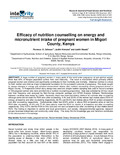Efficacy of nutrition counselling on energy and micronutrient intake of pregnant women in Migori County, Kenya
Abstract
A large number of pregnant women in many parts of the world enter pregnancy at sub-optimal weight. More than 60% of Kenyan population suffers from food insecurity. The result is malnutrition which primarily affects pregnant women and children and significantly contributes to their morbidity and mortality. Maternal nutrition is critical for both mother and child as it lays fundamental foundation for the successful outcome of pregnancy. This study sought to assess changes in energy and selected micronutrient intakes after nutrition counselling among pregnant women in
Migori County. A Prospective Cohort study design was used and simple random sampling was used to recruit a sample of 150 pregnant women who were enrolled into a nutrition counselling programme. Data was collected by 24 hour recall and food frequency and analyzed by Nutri-Survey computer package and SPSS Analysis Software. Relationships between variables were tested by t-tests. Generally, there was improved dietary intake of all nutrients after counselling
although some did not meet the RDA even after counselling. 4.4% and 20.9% of the women had intakes above RDA for energy, at baseline and after counselling respectively, 62.5% and 84.3% had intakes above RDA for protein at baseline and after counselling respectively. Carbohydrate intake had 93.9% within or above RDA at baseline while all met the RDA after counselling. 61.2% and 77.4% were able to meet the RDA for vitamin A at baseline and after counselling respectively. Only 13.5% met the RDA for folic acid and iron each at baseline but after counselling all had intakes below RDA. The finding is important to central and local governments, civil society, intergovernmental agencies, research groups, business enterprises and community under study. The study fills the knowledge gap and therefore contributes to the advancement of knowledge.

